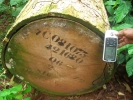 Narcisse Makiandavo used to exploit timber, fuelwood and charcoal illegally to supply buyers in Bangui, the capital city of Central African Republic (CAR). Makiandavo and his compatriots felled hundreds of trees indiscriminately every year, causing serious harm to the natural environment. However, today, Makiandavo and 79 others are vociferous defenders of the environment. "We decided to abandon illegal logging and join the fight against climate change because we realized our activities caused deforestation, wiping out native forests and vegetation whilst destroying the homes of many wildlife species," says Makiandavo, who now heads an association of former illegal loggers. Today, the association has more than 80 members, all former illicit wood exploiters now turned environmental defenders.
Narcisse Makiandavo used to exploit timber, fuelwood and charcoal illegally to supply buyers in Bangui, the capital city of Central African Republic (CAR). Makiandavo and his compatriots felled hundreds of trees indiscriminately every year, causing serious harm to the natural environment. However, today, Makiandavo and 79 others are vociferous defenders of the environment. "We decided to abandon illegal logging and join the fight against climate change because we realized our activities caused deforestation, wiping out native forests and vegetation whilst destroying the homes of many wildlife species," says Makiandavo, who now heads an association of former illegal loggers. Today, the association has more than 80 members, all former illicit wood exploiters now turned environmental defenders.Since 2014, WWF has been providing support to three local NGOs and indigenous communities to fight illegal logging. The NGOs, which include Initiatives pour la Démocratie et le Développement Durable (I3D), Jeunesse pour la Protection de l'Environnement en Centrafrique (JPEC) and Action Verte, helped local and indigenous communities organize Village Forest Governance Committees (CVGF).
“We trained members of the committees on forest monitoring techniques,” says Basile Imandjia, Director of Action Verte. “We also helped them organize associations and they are now engaged in legal activities as an alternative way to obtain the necessary income so that they can take care of their families.” The environmental defenders, now affiliated in associations, wish to engage in legal activities for alternative sources of income. “We want to live a better life by contributing to the fight against illegal wood exploitation, as it negatively impacts the lives of Central African farmers,” Makiandavo says.
The NGOs, supported by WWF, assisted over 80 illegal loggers identify alternative income-generating activities. Some of these include the creation of community reforestation areas for exotic wood species such as Tectona grandis (teck), Leucena or local multi-purpose species including as sapelli, Essesang, Ayous, Fraké, medium and long-term sustainable production of charcoal and, where possible, improved cooking stoves.
"Our aim is to get them actively involved in something that is not totally different from their former activities while encouraging them to be actors in forest restoration and in their own development,” says Deguene.
The reforestation areas will ensure enough supply of timber, firewood and charcoal to Bangui from forest plantations managed by the communities. There is medium-term increase in the value of timber and derived products, especially charcoal, and the collection of non-timber forest products, including caterpillars and Essesang seeds.
“It will be a veritable source of income for the communities and will motivate the erstwhile illegal loggers to desist from going back to their old practices,” says Imandjia.


